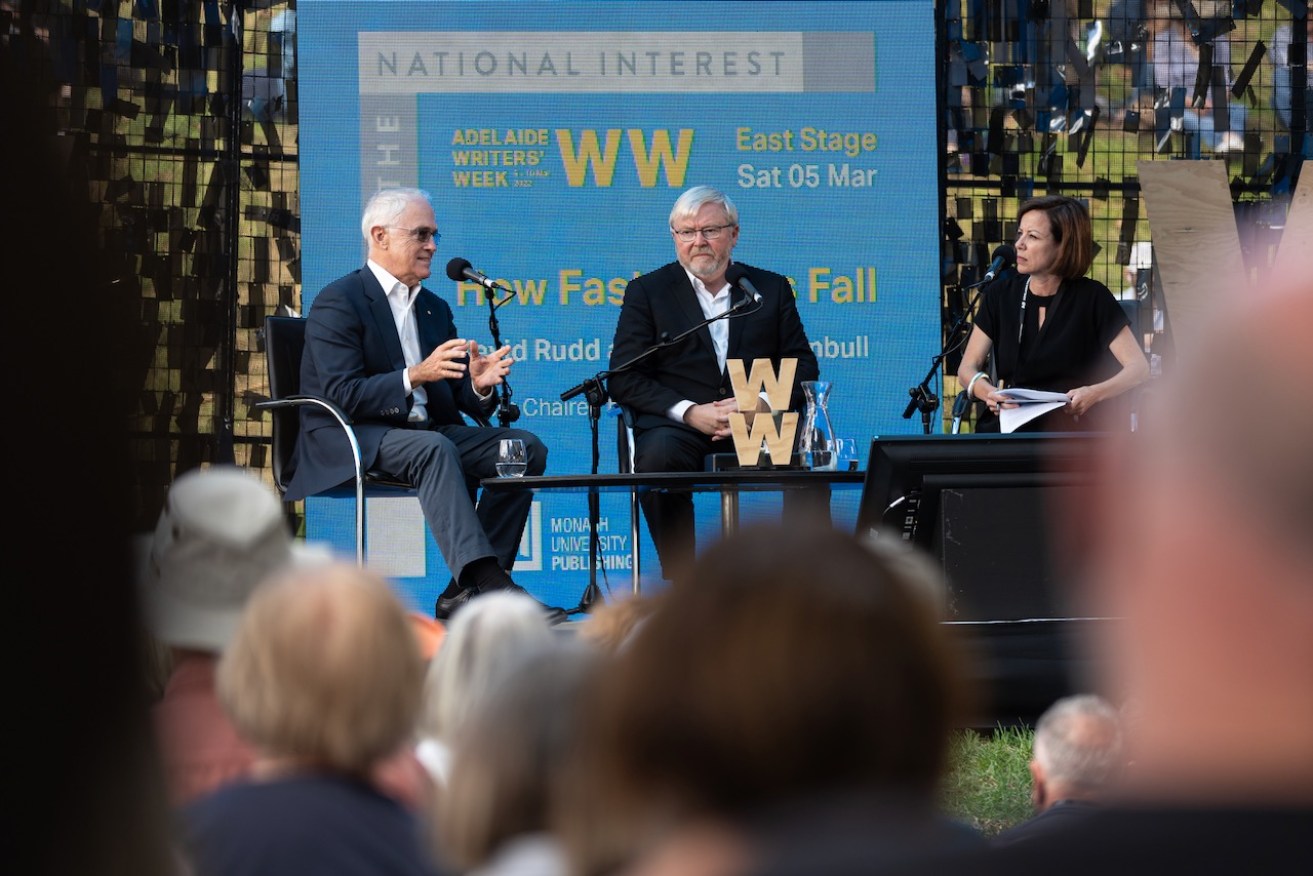Rudd and Turnbull deliver double-handed disdain
Two former Prime Ministers walked onto a stage bearing grudges. It’s not the setup for a joke but the double act of Malcolm Turnbull and Kevin Rudd at Writers’ Week in a packed session that delivered as much withering wit and vitriol as expected.


Malcolm Turnbull and Kevin Rudd talking to Writers' Week director Jo Dyer. Photo: Andrew Beveridge
Writers’ Week director Jo Dyer, with six days to go to the end of her tenure and the start in earnest of her campaign as an independent for the federal seat of Boothby, asked on Saturday about the scandals pouring out of Canberra and whether the rot started at the top.
“It absolutely starts at the top – the leader sets the standard,” said Turnbull, who was Liberal Prime Minister from 2015 until 2018 before being forced out in favour of Scott Morrison. “The meat and potatoes, the basics of government, are competence and integrity and Scott has shown himself to be lacking in both of them.”
Rudd, who was Labor Prime Minister not once but twice, spoke out against a new generation of politicians to whom ideas meant nothing and for whom politics is a game. He said leadership set the tone and standards from above and once they slipped, things unravelled quickly.
“When people look at this new set of standards applying from afar, it begins to attract a new clientele into the business of politics and that, I think, is a problem,” said Rudd who argued that debate and ideas no longer seemed to matter. “I look at Scotty from Marketing (Morrison), and Scotty from Marketing just likes being there.”
Turnbull, whose wife Lucy Turnbull sat in the front row with Kevin Rudd’s wife Therese Rein, said Morrison was a classic case of the “greasy pole” politician who exercised power with no agenda.
“Scott Morrison is a classic case of this; the only thing he seems to be concerned about is religious discrimination,” Turnbull said. “Everything else has been day-to-day tactics.”
Turnbull said Australia under Morrison had surrendered sovereignty in defence to the US by agreeing under the AUKUS alliance to use nuclear-powered submarines that would not be under Australia’s direct control. He said it was uncontested that the submarines could not be built, maintained or operated without the constant, active supervision of the United States Navy.
“Don’t we think that military capabilities we pay for should be wholly and solely under Australian leadership? You think that would be self-evident,” said Turnbull. That has been thrown away but has there been any debate about it? … We have a Prime Minister who is not being upfront about what he is doing in undermining Australia’s defence.”
Turnbull made clear his disdain for Peter Dutton, the defence minister and prime ministerial aspirant who brought on the 2018 challenge that unseated him although it was Rudd who referred to the “pig-ignorant Dutton, my fellow Queenslander, genuinely pig-ignorant” who wanted to make Labor look soft on national security. Turnbull added, “Who will speak up for the pigs, I ask?”
On the vexed issue of China and Xi Jinping’s wolf-warrior diplomacy, Rudd said if either he or Turnbull were Prime Minister, managing China would be exceptionally difficult and that every democracy in Asia and Europe was finding it problematic.
Advising future governments on how to handle China, Rudd said if Australia were to pick a fight with China – which it may need to on a fundamental issue – it should not do so alone.
“You do so in partnership with a whole bunch of other democracies and that, I think, is the way forward,” he said.
Following them on stage was activist and internationally acclaimed author Murong Xuecun whose safe departure from China last year to publish a book telling stories from Wuhan’s 76-day martial law Covid-19 lockdown was something of a miracle. In the days leading up to his planned escape to London via Hong Kong to write and publish The Quiet City, Xuecun talked in code on the phone about a play he wanted to write, sent encrypted emails and left with just a few books and a change of clothes.
Xuecun somehow got through security and was allowed to leave, ultimately for Australia. Speaking through an interpreter at the international launch of his book, Xuecun said after going to Wuhan with the aim of telling stories of tragedy, suffering and resilience that would not otherwise be heard, he was watched and called by the secret police.
“They actually called me many times and each time I felt very nervous,” Xuecun said. “I had been in Wuhan for about a month when I received a call from somebody who said to me ‘what are you doing there?’ I told him I had come just to look around and then he said to me ‘you’d better be careful, do not become infected, that would be troublesome for you’.”
Xuecun said he left Wuhan soon after and felt watched and listened to, making whispered calls under a quilt to avoid being overheard.
“It is a fact to say that in China, the secret police are very strong but the fact I am sitting here with you and speaking freely, proves that they are not so powerful, they can’t know everything we are doing,” said Xuecun.
Hosting the session, author and critic of Chinese influence in Australia, Clive Hamilton, praised the bravery of Xuecun who had seen friends and fellow writers in China arrested and brutalised.
InReview will be reporting from Writers’ Week each day.




